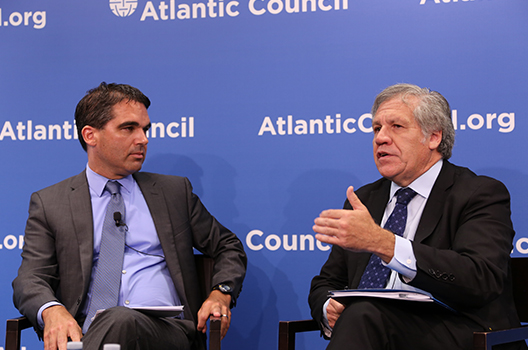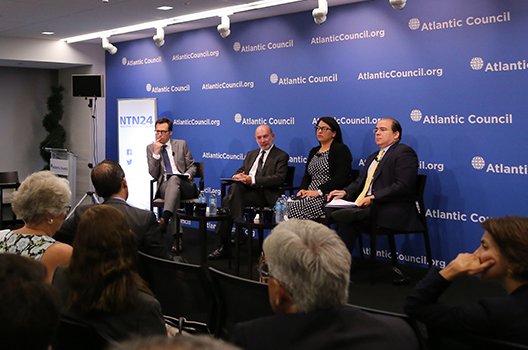 Since the beginning of 2017, thousands of Venezuelans have taken to the streets to protest the government’s repressive policies and worsening economic and humanitarian crisis. Following a massive referendum on July 16 in which millions of Venezuelans voted against a constituent assembly to rewrite the constitution, the international community is again considering its next move.
Since the beginning of 2017, thousands of Venezuelans have taken to the streets to protest the government’s repressive policies and worsening economic and humanitarian crisis. Following a massive referendum on July 16 in which millions of Venezuelans voted against a constituent assembly to rewrite the constitution, the international community is again considering its next move.
To discuss the path ahead for the crisis-stricken country, on Friday, July 21, the Adrienne Arsht Latin America Center hosted a panel discussion, ‘Venezuela on the Edge: The Time for New International Action’ with Secretary General of the Organization of American States Luis Almagro. The event also launched the Atlantic Council’s new Venezuela Tracker, which for the first time aggregates a wide range of indicators like inflation and external debt in real time. The beta version is set to be updated over the next few weeks with additional indicators on health and poverty.
Fred Kempe, president and CEO of the Atlantic Council, delivered welcome remarks and introduced secretary general Almagro, who explained the evolution of the crisis. The secretary general summarized the situation saying, “if we had acted in defense of democracy, this would have prevented the situation from reaching the point it has now, where it is a security and humanitarian crisis with a government that has undermined democracy to the point of becoming a real dictatorship.” Almagro appealed to the international community to defend the people of Venezuela and publicly denounce the government’s disregard for human rights and democracy.
Following the keynote remarks, Jason Marczak, director of the Latin America Economic Growth Initiative at the Adrienne Arsht Latin America Center, sat down for a keynote conversation with Luis Almagro. The secretary general spoke favorably of the sanctions already implemented by the United States against leaders of the Venezuelan government, and noted that further sanctions would be welcome. When asked about impact of potential US oil sanctions, he stressed that revenues from Venezuela’s oil industry predominantly benefit the government, but stated an analysis of the side effects would be needed before such widespread sanctions are put in place.
The secretary general highlighted the government’s indifference for its population, pointing out that “if the government had listened to the people the problems would already be solved. If everything the people had tried to express in September and October of last year, if the government had truly listened then, we would be looking an entirely different situation today. If all the signatures of the people asking for a recall had been respected the situation would be different. What we have now is a tragedy.”
Following the keynote discussion, Gustau Alegret, US news director for NTN24, moderated the panel discussion with Beatriz Borges, executive director of Venezuela’s Center for Justice and Peace (CEPAZ), Francisco Rodriguez chief economist at Torino Capital, and Ambassador Luis Alfonso de Alba, permanent representative of Mexico to the Organization of American States.
Beatriz Borges offered her perspectives of the on-the-ground situation, emphasizing that “people are speaking of a humanitarian crisis but [what we have is] a complex humanitarian emergency, because in Venezuela there are no resources for dealing with this crisis [that makes it] an emergency…those statistics that are so shocking, that’s the reality that we are living.” She added that two hundred thousand Venezuelans are suffering from chronic illnesses that are becoming life threatening because of the scarcity of medicine.
 (From left to right) Panelists Ambassador Luis Alfonso de Alba, permanent representative of Mexico to the Organization of American States; Beatriz Borges, executive director of Venezuela’s Center for Justice and Peace (CEPAZ); and Francisco Rodriguez, chief economist at Torino Capital, take questions from the audience.
(From left to right) Panelists Ambassador Luis Alfonso de Alba, permanent representative of Mexico to the Organization of American States; Beatriz Borges, executive director of Venezuela’s Center for Justice and Peace (CEPAZ); and Francisco Rodriguez, chief economist at Torino Capital, take questions from the audience.
To highlight the economic scale of the crisis, Francisco Rodriguez compared the country’s economic troubles to the rest of the world. “There are only six countries in the world in this century that have had this magnitude of economic contraction. We’re talking about Syria, the Central African Republic, Palestine, Iraq, United Arab Emirates. Of those countries, all but one of them are countries that have been at war. So, effectively, it’s a type of contraction that we see in associated with armed conflict.” Torino Capital recently launched a weekly report on Venezuela’s economy that will closely monitor the financial aspect of the crisis.
Ambassador Luis Alfonso de Alba spoke on the international community’s efforts to find a diplomatic solution to the crisis and criticized nations who had ignored decisions reached during negotiations. “…What is most important is that it has not been a punitive exercise what we’re trying to do, and it has not been led by the United States. This has been a collective vision that has evolved internationally and that has tried all diplomatic ways to solve the problem.” While he and Secretary General Almagro agreed that policies and decisions are influenced by national interests, the ambassador said “it should be made clear that some people were not faithful to their word, to what they had promised.”
The panelists were not enthusiastic about the prospect of additional sanctions, stressing that further limiting governmental revenue would lead to a decreased supply of food and medicine. Citing a recent poll conducted by Torino Capital, Rodriguez warned that US sanctions could fuel a new wave of support for the government. Venezuela almost exclusively exports state-owned oil, meaning almost all of Venezuela’s imports are also managed by the state. “Yes, you’re going to cut the resources that the government has in order to undertake repression [but] you’re also going to cut the resources the government has to undertake food imports.” Ambassador Alfonso de Alba stressed the need to distinguish between multilateral and unilateral sanctions and expressed concern that unilateral sanctions would undermine international efforts.
A group of Latin American nations have formed a coalition in support of a stronger stance on Venezuela, and despite the group’s failure to push through tougher measures against the Maduro government, Ambassador Luis Alfonso de Alba stressed the group’s unwavering commitment to finding a solution. Regardless of the official topic, he and the rest of the G14, as the group is known, will continue to pressure the Venezuelan government and discuss the issue on the international stage.
Moving forward, the international community will need to continue its efforts to pressure the Venezuelan government. In the words of Secretary General Luis Almagro, “there is still work to be done, and what we have done has already brought Venezuela closer to a solution. The people of Venezuela have inspired us to find a solution, at the cost of their own lives, and those lives should be respected.”
Image: The Atlantic Council’s Jason Marczak discusses the crisis in Venezuela with Luis Almagro, the Secretary General of the Organization of American States.
